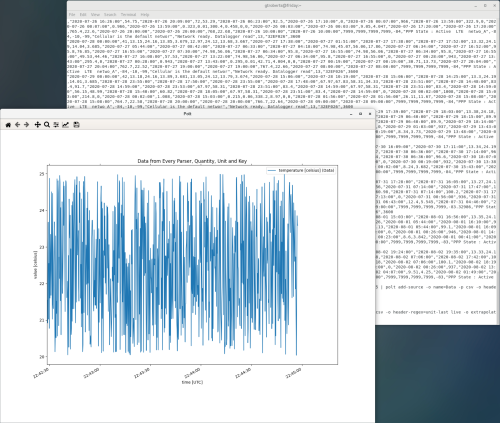






Resumen
LoggerNet Linux es la solución en el caso que uno desee ejecutar el servidor LoggerNet en un entorno Linux. El paquete incluye la versión Linux del servidor LoggerNet. A parte hay que adquirir LoggerNet Remote (Windows). LoggerNet Remote debe ejecutarse en otro ordenador de la red, y sirve para gestionar el servidor LoggerNet Linux.
Ver condiciones licencia de uso en el LoggerNet for Linux Instruction Manual.
Leer másVentajas y características
- Capable of running a LoggerNet server in a Linux environment
- Includes all LoggerNet functions
- Provides user- and group-level security for data loggers and data access
- Can be managed from a remote Windows PC using LoggerNet Remote
- Runs as a daemon (Linux equivalent to a Windows service)
- Exports data to third-party applications using command-line tools (CoraScript) or LoggerNet Remote
- Can be accessed by multiple LoggerNet Remote client connections and users at the same time
- Capable of setting up subnets of the network map
- Includes many of the functions of LoggerNet Admin but without a user interface; UI provided by LoggerNet Remote
Imágenes

Descripción detallada
LoggerNet Linux provides a solution for those who want to run the LoggerNet server in a Linux environment. The package includes a Linux version of the LoggerNet server. A Windows version of LoggerNet Remote is required. The Microsoft Windows-based client applications in LoggerNet Remote are run on a separate computer, and are used to manage the LoggerNet Linux server.
Note: LoggerNet Linux requires LoggerNet Remote, which is available on the Ordering Info page.
Preguntas frecuentes
Número de FAQs relacionadas con LNLINUX: 4
Expandir todoDesplegar todo
-
LoggerNet for Linux should run on most distributions with base distributions of Red Hat or Debian.
-
Yes. LoggerNet for Linux (LNLinux) allows the LoggerNet server to be run on a Linux computer. The LoggerNet server collects and stores the data, while setup and management of the network are easily handled from a Windows computer running LoggerNet Remote or, rather tediously, using Cora Command on the Linux computer.
-
The blog article "How to Navigate the World of Software Upgrades, Patches, and Trials" explains the difference between patches (free of charge) and upgrades (for a fee). This example quickly shows the difference between an upgrade and a patch:
Upgrade Patch Major version change, such as 1.3 to 2.0
Minor version change, such as 1.3 to 1.4
Typically requires purchase for a fee
Free of charge
-
When a LoggerNet client, such as the Connect screen (in LoggerNet Remote) needs to connect to a remote LoggerNet Admin or LoggerNet Linux installation, the default port used is 6789.
The default port can be altered using the command line argument ipport. The following is the explanation from LoggerNet Help:
Command line arguments allow you to change LoggerNet's default behavior when it is started from a shortcut. /IPPORT=XXXXX Causes the server to use port XXXXX for TCP/IP communications with clients. This is useful if some other software is using LoggerNet's default port of 6789. Usage: "C:\Program Files\CampbellSci\LoggerNet\ToolBar.exe" /ipport=12345
Compatibilidad
Nota: lo siguiente muestra información de compatibilidad notable. No es una lista de todos los productos compatibles.
Dispositivos Comunicaciones
| Producto | Compatible | Nota |
|---|---|---|
| KonectPBRouter |
Software
| Producto | Compatible | Nota |
|---|---|---|
| KonectGDS |
Información de compatibilidad adicional
Computer
The disk with the LNLinux Server contains a Debian distribution and a Red Hat RPM distribution. Each distribution includes a 64-bit version.
LoggerNet Remote is required for use with LNLinux. The LoggerNet Remote clients used to manage the LNLinux server run on an Intel-based computer with a Microsoft Windows operating system. The recommended minimum computer configuration for running the LoggerNet Remote clients is Windows 7. The LoggerNet Remote clients also run on Windows 8, 10, and 11.
Communications
The LoggerNet server provides communications with the data loggers over various mediums including serial ports, TCP/IP connections, and Linux compatible phone modems.
Especificaciones
| Operating System | Windows 11 or 10 (for LoggerNet Remote) |
| RPM Distribution | Red Hat (64 bit) |
| Debian Distribution | 64 bit |
Documentos
Folletos producto
Casos de aplicación
Horseshoe Irrigation is a small, rural irrigation company in central Utah, managing around 15,000 water......leer más
Lightning strikes are a serious concern for school officials who are responsible for protecting the......leer más
The Oklahoma Mesonet is a statewide environmental monitoring network developed through the cooperative efforts of......leer más




